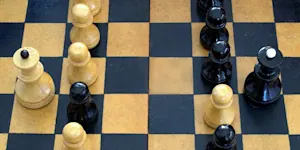What Makes This Word Tick
"Invert" is a word that loves a good flip-flop. It revels in turning things upside down or inside out, quite literally. Whether you're talking about inverting a mathematical function or creating a topsy-turvy cake, this word thrives on change and contrast.
If Invert Were a Person…
Imagine a person who loves shaking things up, always looking for a fresh perspective — that’s "invert" as a person. Ever the non-conformist, they walk into a room and instantly rearrange the furniture, sparking innovation and a little chaos along the way.
How This Word Has Changed Over Time
Once strictly a scientific and mathematical term utilized in labs and academia, "invert" has wiggled its way into more everyday conversation. As society embraces innovation and remix culture, the broader applications of "invert" only grow.
Old Sayings and Proverbs That Use Invert
While there’s no classic proverb that states "invert," the concept isn't foreign to wisdom. Consider phrases like "turn the tables" and "flip the script," both nodding to a similar sense of reversal and change in fortune.
Surprising Facts About Invert
Did you know that in zoology, "invertebrates" boast an "invert" twist by not having a spine? And, in the culinary world, we have "inverted sugar syrup," a sweeter and more dissolvable form of sugar often used in confectionery delights.
Out and About With This Word
"Invert" steps out of the abstract when employed in gardening or interior design, suggesting altered layouts to maximize beauty or functionality. Whether inverting the growth cycles of plants or swapping your living room's East and West sides, it brings delightful surprises.
Pop Culture Moments Where Invert Was Used
Don't forget "Stranger Things," where the concept of an "Upside Down" world reinvents our perception of alternate realities. The show captivates audiences with its eerie take on inversion, though "invert" isn't directly namedropped.
The Word in Literature
Typically found whispering in the pages of scientific treatises, "invert" has begun making cameo appearances in novels discussing societal changes or alternate realities. Think of dystopian worlds where norms are inverted to shocking effect.
Moments in History with Invert
Consider the Industrial Revolution, a classic period where much of life was inverted as old jobs disappeared and new ones came into being. "Invert" would feel right at home, witnessing the seismic shifts that machinery brought to society.
This Word Around the World
In Spanish, "invertir" doesn't just mean to flip; it also means to invest, demonstrating a fascinating duality of reversal and resource allocation. Across cultures, inversion can manifest in disciplines as diverse as music and art, each taking its unique spin.
Where Does It Come From?
"Invert" pulls its roots from the Latin "invertere," a blend of "in," meaning "into," and "vertere," meaning "to turn." This etymology perfectly encapsulates the literal flipping action inherent in the word.
How People Misuse This Word
Often misapplied when people actually mean "subvert," as in undermining norms rather than simply turning them around. Remember, inverting doesn't imply rebellion but rather rotation.
Words It’s Often Confused With
Revert: Reverting involves returning to a previous state, while inverting involves flipping the current one.
Subvert: This carries more of an undermining or overthrowing action, whereas invert is about a reversible change.
Convert: Conversion implies a transformation, while inversion signifies a flip or reversal.
Additional Synonyms and Antonyms
Synonyms include reverse, transpose, and flip. For antonyms, consider maintain or uphold, which keep the status quo steady and unchanged.
Want to Try It Out in a Sentence?
"When the artist decided to invert the canvas, she found a fresh inspiration in the upside-down landscape she painted."
















